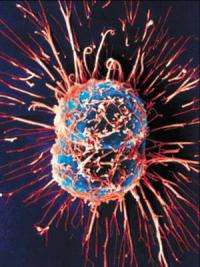Study unlocks more about cancer

Ground-breaking research from Griffith University on the Gold Coast has some scientists wondering if the entire study of cellular biology needs to be adjusted.
A research collaboration between Griffith and the Malaghan Institute in Wellington, New Zealand has made the discovery that mitochondria are capable of passing through the healthy membrane of a host cell into defective tumour cells, possibly kicking off the rapid proliferation of tumour cells which is the hallmark of cancer.
Until now each cell was believed to be a unique entity, with mitochondria and mitochondrial DNA (mtDNA) bound within the cell membrane. The Griffith and Malaghan research has found this mtDNA is capable of moving from a healthy cell to a dysfunctional tumour cell.
Professor Jiri Neuzil led the Griffith research and believes the discovery of mtDNA movement may form whole new areas of study.
"What we've found is that it's possible for genetic material to pass from one cell to another and for that material to bring a cell 'back to life'. This is a considerable finding in our understanding of human biology," says Professor Neuzil.
"This process has previously been observed by scientists in a laboratory setting, but together with the New Zealand group, we have been able to perform experiments that provide evidence for this process in a live animal."
Traditional biology has told us that all life forms are constructed of cells and that inside these cells are the basic information to build whatever life form is intended: namely DNA (the plan for the life form) and the energy needed to carry out the instructions, called mitochondria.
To make it confusing there is another element within the cell called mtDNA. As its name suggests, this has a little of both and is crucial for ensuring how the whole process of cell growth happens.
Exactly how this transfer of mtDNA happens is unclear. Whether the interacting cells temporarily fuse together, or if cell membranes form 'nanotubes' through which the mtDNA can pass is yet to be shown.
"It's fascinating to realise that cancer cells have this ability to 'steal' mitochondria with DNA from other cells," says Professor Neuzil.
"The plasticity of cancer; its ability to adapt and change and overcome threats is its great strength and may be a very important factor as to why no one has yet got very close to a cure.
"Our research has not only uncovered another insight into cancer's adaptability, but possibly other conditions as well. It is possible that this could happen in other diseases where mtDNA is defective, like neurodegenerative diseases, but this is speculation at this stage," he says.
Defective mitochondrial DNA is known to account for around 200 diseases and is speculated to be part of many more.




















